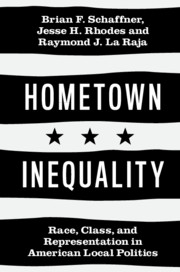Book contents
- Hometown Inequality
- Hometown Inequality
- Copyright page
- Dedication
- Contents
- Figures
- Tables
- Acknowledgments
- 1 Race, Class, and Representation in Local Government
- 2 Studying Inequality in Representation in Local Government
- 3 Municipal Politics As Sites of Racial and Class Contention
- 4 Local Political Participation, Municipal Elections, and the Prospects for Representation in Local Government
- 5 Racial Inequality in Representation on Municipal Councils and in Policy
- 6 Predictors of Racial Inequality in Representation
- 7 Economic Inequality in Representation on Municipal Councils and in Policy
- 8 Predictors of Economic Inequality in Representation
- 9 Race, Class, and Representation in Local Politics
- Bibliography
- Index
9 - Race, Class, and Representation in Local Politics
Published online by Cambridge University Press: 20 June 2020
- Hometown Inequality
- Hometown Inequality
- Copyright page
- Dedication
- Contents
- Figures
- Tables
- Acknowledgments
- 1 Race, Class, and Representation in Local Government
- 2 Studying Inequality in Representation in Local Government
- 3 Municipal Politics As Sites of Racial and Class Contention
- 4 Local Political Participation, Municipal Elections, and the Prospects for Representation in Local Government
- 5 Racial Inequality in Representation on Municipal Councils and in Policy
- 6 Predictors of Racial Inequality in Representation
- 7 Economic Inequality in Representation on Municipal Councils and in Policy
- 8 Predictors of Economic Inequality in Representation
- 9 Race, Class, and Representation in Local Politics
- Bibliography
- Index
Summary
On August 9, 2014, Michael Brown, an unarmed eighteen-year-old African American man, was fatally shot by Darren Wilson, a white police officer, following a violent altercation on the streets of Ferguson, Missouri. With many of the crucial facts surrounding Brown’s death under dispute – in particular, whether Wilson’s stop of Brown was justified, whether Wilson or Brown initiated the confrontation, whether Brown surrendered or resisted arrest – many residents in the majority African American community took to the streets to protest what they viewed as an emblematic instance of police brutality, as well as general indifference among community leaders toward the concerns of black and brown residents. In response, Ferguson police – and eventually the Missouri National Guard – mustered an intimidating show of force in an effort to contain the protests. The presence of large numbers of heavily armed police and guardsmen exacerbated an already tense situation, leading to charged and sometimes violent encounters between protestors and law enforcement officials. Wilson’s killing of Brown, the heated and sometimes violent protests, and the extraordinary heavy-handedness of the police response made the events in Ferguson national news, riveting public attention and forcing conversations about police brutality and the over-policing of communities of color.
Keywords
- Type
- Chapter
- Information
- Hometown InequalityRace, Class, and Representation in American Local Politics, pp. 213 - 236Publisher: Cambridge University PressPrint publication year: 2020



